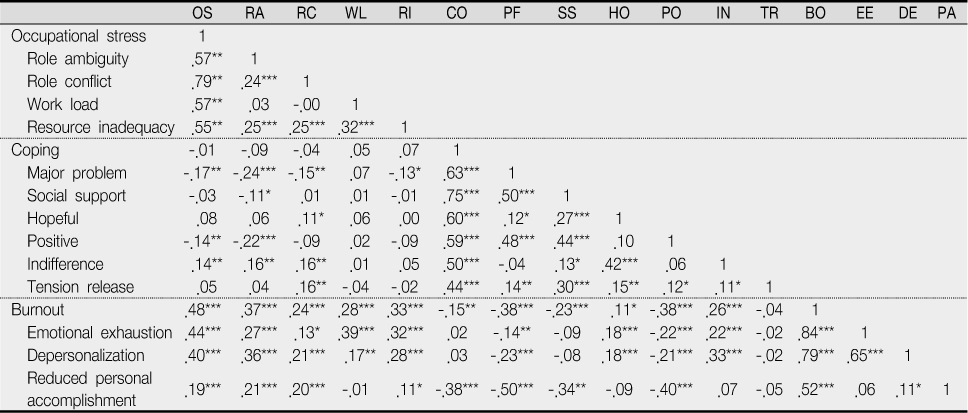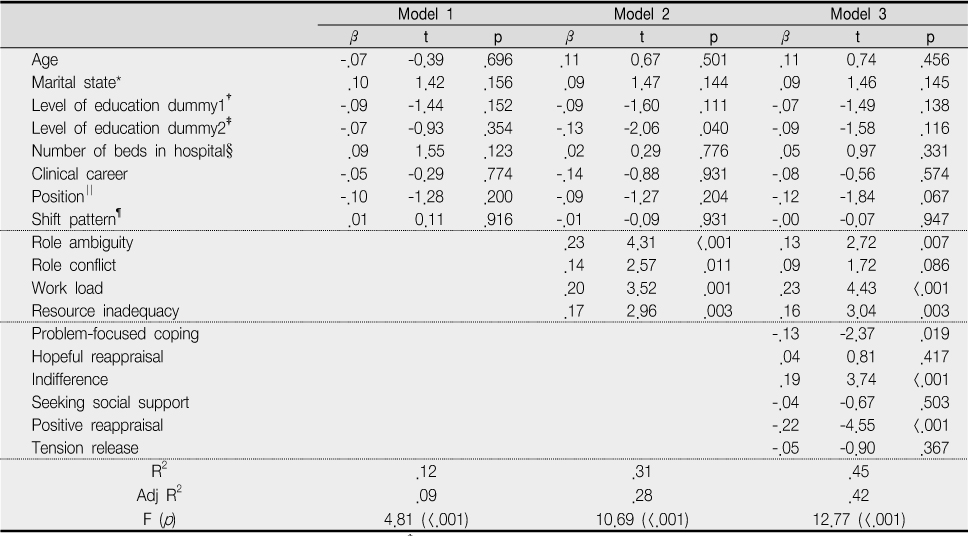1Department of Nursing, Hansei University, Korea.
2Department of Nursing, University of Ulsan, Korea.
Copyright © 2012 Korean Academy of Nursing Administration
This research was supported by Ulsan University Research Fund, 2011 (2011-0835).

OS=Occupational Stress; RA=Role Ambiguity; RC=Role Conflict; WL=Work Load; RI=Resource Inadequacy; CO=Coping; PF=Problem Focused; SS=Social Support; HO=Hopeful; PO=Positive; IN=Indifference; TR=Tension Release; BU=Burnout; EE=Emotional Exhaustion; DE=Depersonalization; PA=Reduced Personal Accomplishment.
*p<.05; **p<.01; ***p<.001.

*Marital state dummy coded to unmarried=1, married=0; †Level of education dummy1 coded to university=1, the others=0; ‡Level of education dummy2 coded to graduated over=1, the others=0; §Number of Beds in hospital dummy coded to ≥500=1, 300-<500=0; ∥Position dummy coded to manager=1, staff nurse=0; ¶Shift pattern dummy coded to rotating shifts=1, day shift only=0.

General Characteristics of Participants (N=397)
Occupational Stress, Copying and Burnout (N=379)
Occupational Stress, Coping and Burnout according to Characteristics of Participants (N=397)
Correlation Occupational Stress, Coping and Burnout (N=397)
OS=Occupational Stress; RA=Role Ambiguity; RC=Role Conflict; WL=Work Load; RI=Resource Inadequacy; CO=Coping; PF=Problem Focused; SS=Social Support; HO=Hopeful; PO=Positive; IN=Indifference; TR=Tension Release; BU=Burnout; EE=Emotional Exhaustion; DE=Depersonalization; PA=Reduced Personal Accomplishment.
*p<.05; **p<.01; ***p<.001.
Factors Predicting Nursing Burnout (N=397)
*Marital state dummy coded to unmarried=1, married=0; †Level of education dummy1 coded to university=1, the others=0; ‡Level of education dummy2 coded to graduated over=1, the others=0; §Number of Beds in hospital dummy coded to ≥500=1, 300-<500=0; ∥Position dummy coded to manager=1, staff nurse=0; ¶Shift pattern dummy coded to rotating shifts=1, day shift only=0.
OS=Occupational Stress; RA=Role Ambiguity; RC=Role Conflict; WL=Work Load; RI=Resource Inadequacy; CO=Coping; PF=Problem Focused; SS=Social Support; HO=Hopeful; PO=Positive; IN=Indifference; TR=Tension Release; BU=Burnout; EE=Emotional Exhaustion; DE=Depersonalization; PA=Reduced Personal Accomplishment. *
*Marital state dummy coded to unmarried=1, married=0; †Level of education dummy1 coded to university=1, the others=0; ‡Level of education dummy2 coded to graduated over=1, the others=0; §Number of Beds in hospital dummy coded to ≥500=1, 300-<500=0; ∥Position dummy coded to manager=1, staff nurse=0; ¶Shift pattern dummy coded to rotating shifts=1, day shift only=0.